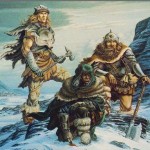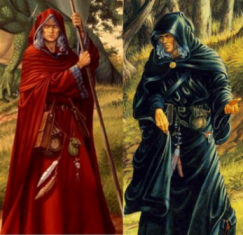![]() When you conjure up memories of your favorite stories – in books, movies or in your RPG campaigns – what’s often the first thing you remember? If you thought or mouthed “the characters,” then read on. And if you didn’t for some wild yet almost assuredly creative reason, read on anyway because it’s worth it!
When you conjure up memories of your favorite stories – in books, movies or in your RPG campaigns – what’s often the first thing you remember? If you thought or mouthed “the characters,” then read on. And if you didn’t for some wild yet almost assuredly creative reason, read on anyway because it’s worth it!
Atmosphere is defined as “the dominant mood or emotional tone of a work of art, as of a play or novel: the chilly atmosphere of a ghost story” – for our purposes, this literary definition serves us best. Now I’m not going to fire us all back to English class (and oh how I honestly miss those halcyon days), but I do want to emphasize the importance of the connection between atmosphere and the cast of characters in your roleplaying games.

Just look at the in-context example of atmosphere’s definition. The mere presence of a ghost indicates characters, and likely human characters with all sorts of very real and identifiable human emotions. Strong ones like fear, hate and love – the latter usually buried deep in the story somewhere, somehow, preferably as convoluted or tragic as possible – are common in ghost stories. Certainly other important elements help create atmosphere (music, descriptive language, etc.), yet characters create and drive the lion’s share of mood and atmosphere in a story. If the character is shallow, boring, or we simply don’t know much about him or her, or the actor is terrible, they’ve lost you before you also realize how bad the background music, plot or dialogue is.
 Memorable Characters from Fiction
Memorable Characters from Fiction
Consider some characters or actors with tremendous “presence.” Personalities that are strong, that reach out of the story and draw you in and grab hold. Who comes to mind for you? Maybe Al Pacino’s many characters over the years? Gandalf? Drizzt Do’Urden? Raistlin? Our choices could go on forever.
It’s the same thing with your characters. If your game’s characters feel a little – or a lot – blah, then guess what? There’s a good chance you’re killing your game’s atmosphere by not trying hard enough to play – or more appropriately, perform – in-character. RPGs are a storytelling experience. Great stories demand great, memorable characters you can identify with. Their attitudes, emotions and actions create the mood and atmosphere, almost like some sort of aura. And everyone likes it when the good guys have the auras, not the monsters!

Heroes of Shadow’s Characters
How about the highly anticipated Heroes of Shadow sourebook coming out in April? It will undoubtedly have snippets about the Shadowfell in it to expand on Manual of the Planes’ material – nevermind all the exciting new expanded setting info The Shadowfell: Gloomwrought and Beyond will bring in May. But it’s Heroes of Shadows’ actual classes and races that will most treat us to the motivations and actions of dark fantasy’s anti-heros. Those sections will help us conjure up the images of all sorts of dark heros – and villains, no doubt. That book, more than any D&D 4e ‘shadow’ book before it or after it, will create a very evocative atmosphere because of the entire cast of characters it will introduce and inspire.
Your characters are the soul of great RPGs.
More Great Resources
There’s so much more to this aspect of RPGs, but for now, here’s a few truly simple and fun atmospheric ideas from a few of the best RPG and D&D sites out there. Whether you play or run your game, go ahead and floor everyone with these ideas in your own game:
Characters with Character: Random Personality Generator by Ryven Cedrylle on At Will
How to Use Body Language for Better Storytelling by Scott J. Compton from Johnn Four’s Roleplaying Tips
People Generators (favorite sins, virtues, motivations & more!) by Hannah Lipsky of Chaotic Shiny Productions
[…] When you recall a favorite time in your D&D games, what do you think of? I bet it’s not some rule or mechanic! No, it’s typically something that happened in the story or an adventure, or about something funny or surprising someone did or managed to pull off. You remember the crazy stories and awesome personalities. […]
[…] What is Atmosphere? Not What, but Whom […]